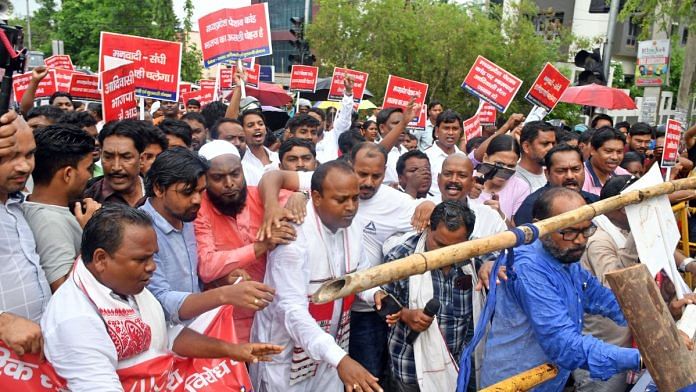Khunti: On Sundays, tribal people gather in their traditional clothes and jewellery in Khunti, Jharkhand, to discuss how to revive their cultural traditions and customs. It’s a 12-year-old practice. But in the last two weeks, there has been palpable panic in these meetings and heated debate over Prime Minister Narendra Modi’s move to introduce the Uniform Civil Code across India.
These meetings are now turning into training sessions for mobilising, resisting and opposing the Bharatiya Janata Party’s UCC measure. It’s not just the All India Muslim Personal Law Board; the ground has already begun to stir in tribal India. Over 100 protests have taken place so far. More than 30 tribal organisations protested under the umbrella group Adivasi Samanvay Samiti in Ranchi in early July, took out Aakrosh Juloos (anger processions), and picketed outside the state BJP headquarters.
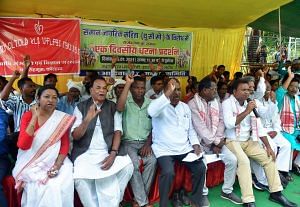
Women dressed in white, green and red sarees begin arriving in Khunti’s Karam Akhara — a centre of faith of the Munda tribals, on a recent Sunday — from their villages by tempos and local buses with their families. At the top of their list of fears is them losing their hard-fought land rights. Then comes their indigenous cultural practices of marriage, inheritance and child adoption.
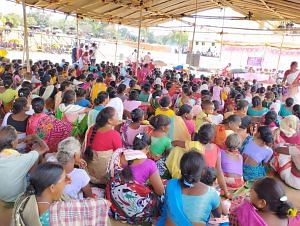
Sitting on a green and blue striped mat with the others, Mudesna Topno, asks how the UCC will affect her rights as a tribal woman. She’s agitated and shoots out questions furiously.
“We have been practising our rituals and customs and kept our land intact for centuries. Will the UCC threaten our Astitva [existence]?” she asks.
Others are upset over the UCC reframing inheritance laws, which will allow them to claim a part of their ancestral property.
“We are the descendants of Birsa Munda. We know how to fight for our land,” says another tribal woman Manonita. Large portraits of tribal icons Gaya Munda, Birsa Munda, and Sidhu and Kanhu Murmu (popularly known as Sidhu-Kanhu) hang on the walls, and a large traditional musical instrument, Mandar, hangs from the roof. “We do not want change in our tribal society, which has its own system. We want to save our land,” she says, as others murmur in agreement.
Ever since Modi said India cannot have separate laws for its people and the opposition should stop instigating Muslims, the Law Commission began conducting public consultations on UCC. But several tribal groups in Jharkhand, Chhattisgarh, Nagaland, Madhya Pradesh and Rajasthan have voiced their opposition. Sushil Kumar Modi, BJP MP and the chairman of the Parliamentary Committee on Law and Justice, also said tribal populations must be kept out of the UCC.
The Rashtriya Swayamsevak Sangh-affiliated body Vanvasi Kalyan Ashram, which works in tribal areas in Jharkhand and other parts of India, is caught between a rock and a hard place.
“UCC is a good thing, but we have requested the Law Commission to visit tribal areas and try to understand the traditional system. The commission should not give its report in a hurry,” says Satyendra Singh, vice-president of the Vanvasi Kalyan Ashram.
Durgawati Odeya is not easily swayed. As founder and head of the Central Sarna Sangom Committee, she aims to educate tribals about their traditions and customs. In pursuit of this goal, she conducts training sessions for tribals to protest against the UCC.
“From birth to death, everything is different among us. We have had a distinctive tradition for centuries,” says Odeya during the session on Sunday.
She sits on a wooden chair, clutching a book on their god of nature, Singbonga, in her hand. Her group creates awareness about UCC through Gram Sabha meetings and gathering villagers by beating the traditional Mandar drum.
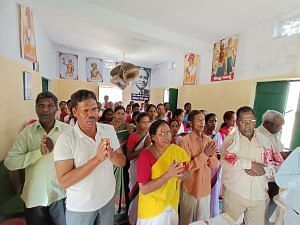
“We have lost our lands in the past, and the UCC has brought a new threat. We are people who worship nature. Connecting us to the same culture is completely wrong. We don’t want any change in our traditional way of marriage, adoption, divorce, inheritance.” says Odeya.
In the end, they pray to Singbonga to protect them from UCC. Theirs is not a coy appeal to the gods. They clap their hands, move their bodies, and toss their hair as they pray for the winds of change to blow away from them.
The effort to unite India, bring equity for women, and do away with outdated religious practices, is now also exposing real faultlines in the uniformity politics that’s underway. India’s fragile fabric of diversity cannot be wished away, but neither can 21st-century demands for a common civil law. This conflict at the heart of the UCC debate is giving rise to demands for exceptions for some communities.
Also read:
Land is sacred
White and red coloured flags adorn the branches of the Sakhua or Sal trees on the ritual sites of Adivasi settlements. Their gods, Burubonga, Ekirbonga and Singbonga, embody the sun, the mountains, the land and water bodies.
Land is central to the identity of the tribes in Jharkhand. It is considered a community property and not an individual one. For that, they fought many battles from the 1700s right down to the first half of the 20th century against British colonisers. It wasn’t in vain. The Chota Nagpur Tenancy Act (CNTA) of 1908, the Santhal Pargana Tenancy Act (SPTA) of 1876, and Wilkinson’s Rule in 1837 all gave special provisions to Jharkhand’s 32 tribes. These are recognised under the Constitution even today.
“In a tribal society, the land is not a private entity, but it is related to the community or clan, and no one has the right to sell it,” says Lakshmi Narayan Munda, one of the prominent faces protesting the UCC in the state.
Unlike some communities in the Northeast, Jharkhand’s tribal society is strictly patrilineal. Land is divided only among the men, so it remains within the same clan. The tribals have pahans (priests) who manage all their important customs, and tradition dictates that separate land be provided to them. On this land, the community performs and celebrates all its important rituals and festivals, such as Sarhul (worship of the Sal tree/nature) and Karma (worship of Karma).
Land isn’t just an asset but a way of life for tribals. It has been a lightning rod for the community too. All past uprisings have been rooted in land – from Birsa Munda’s revolt to the Kol rebellion. And the fight has continued since.
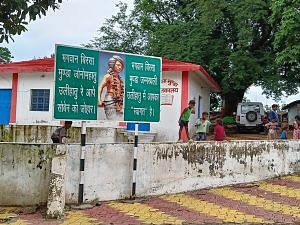
In 2016, the BJP government under former CM Raghubar Das introduced an ordinance seeking changes to CNTA and SPTA – British-era laws protecting tribal land to this day. The amendments diluted the tenancy Acts, allowing for the sale of tribal land and facilitating its acquisition for “public interest projects” like roads, dams and pipelines. Adivasi opposition was swift and widespread. In an appeal to the president of India, signatories warned that the amendments would put the scheduled tribes, scheduled castes and other backward classes in the vulnerable situation of losing land and livelihood.
Then-Governor Droupadi Murmu, now India’s first tribal woman president, refused to accept the controversial amendments, and the state government was forced to withdraw them.
But the intervening months were marked by protests, police action and personal loss. In October 2016, hundreds of villagers from Khunti district clashed with the police as it tried to stop them from joining other tribal groups amassing at Ranchi in protest against the BJP’s ordinances. The police opened fire, and tribal leader Abraham Munda was killed. Today, Abraham Chowk at Rugdi Kolme village in Khunti district constantly reminds tribals of the need to guard their land.
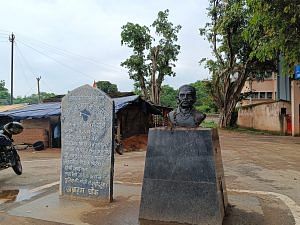
Events of the past have Adivasis leery of the government’s intentions.
“In a diverse country like India, where there is so much inequality in political, economic and social terms, it is absolutely meaningless to talk about a uniform civil code,” says Lakshmi.
In a couple of days, Ranchi will once again emerge as the focal point of protests. Tribal leaders from Jharkhand have invited their counterparts in West Bengal, Odisha, Madhya Pradesh, Bihar and Chhattisgarh for a meeting in the state capital on 30 July.
“The tribal society will not tolerate any change in customary laws. UCC will affect our social fabric, which will create chaos in the society,” says Deo Kumar Dhan, coordinator of the Adivasi Samanvay Samiti.
Also read: ‘Want to study’ — Jharkhand tribal woman who was ‘kicked, tortured, choked’ by BJP woman leader
Inheritance matters
All these anxious debates are taking place when no UCC draft has been released by the Modi government yet. What complicates the discussion is that most tribal customs in India reflect the dizzying diversity of over 700 communities. Many are practised but not codified, which also adds to some confusion in the debate. It’s a complex maze; even the slightest change can be messy and fuel anxieties. Without a wide-ranging political and social consensus-building exercise, this will likely turn into a hot-button issue that tribal states can ill-afford, say analysts.
“Adibasis are very suspicious of non-tribals. Quite rightly, because the role of non-tribals has in the past been one of Dikus [outsiders]. The non-Adibasi has played a very damaging role in the past,” Jaipal Singh Munda had said at the Constituent Assembly debate on 16 December 1946. He declared he was proud to be a jungli.
“As a jungli, as an Adibasi, I am not expected to understand the legal intricacies of the Resolution. You cannot teach democracy to the tribal people; you have to learn democratic ways from them. They are the most democratic people on earth.”
Alok Prasanna Kumar, senior resident fellow at the Vidhi Center for Legal Policy, pointed out that Adivasis are neither governed by Hindu law nor are their practices codified.
“When it comes to uniform, the question arises: What that uniformity will be?”
There is no uniformity in succession practices among tribal groups. Some follow matrilineal customs in the Northeast, but the property is passed on to the male heirs in Jharkhand. If the UCC is framed around the question of women’s inheritance rights, it may go against Munda tribes’ age-old practice. Here, daughters don’t get the right to their father’s property after marriage. That said, women enjoy equal rights before marriage. If a woman returns to her family home after marriage, she has a right to a portion of her father’s property, but she cannot sell it.
This is practised to keep ancestral land within one kili or clan, explains tribal law expert Ram Chandra Oraon.
It is rare for tribal members to marry within the same kili. The fear now is that if the UCC enforces land inheritance rights for women, then ancestral land guarded by generations can be claimed by the clan she marries into.
“They believe women and men in the same clan are brothers and sisters,” says Oraon, an assistant professor at the National University of Study and Research in Law (NUSRL), Ranchi. It’s tradition for the eldest son to get a larger share of the ancestral property, which he will ‘give’ his sister should she leave her husband and return to the family home.
The UCC threatens this collective way of life.
“The tribal society talks about collective rights, while other societies talk about individual rights. Coming of UCC will have the biggest impact on collectivism,” says Dayamani Barla, a social activist, while sipping chai at a shop in Ranchi. She sees the UCC as yet another attempt to dilute the Adivasi way of life—a pattern, an “external agenda” that every government or ruler has been trying to enforce over centuries.
“A new step is being taken in the direction of one nation, one law,” she declares.
In 2018, the 21st Law Commission had suggested codification in its report, but little headway was made. Tribal law experts and activists argued for the need to document customary law and tribal research institutes among Adivasi communities across India, which the UCC can then take into account. The commission issued a detailed 185-page report titled Reform of Family Law, rejecting this demand by calling the UCC “neither necessary nor desirable at this stage” in the country.
“Cultural diversity cannot be compromised to the extent that our urge for uniformity itself becomes a reason for threat to the territorial integrity of the nation,” reads the 21st Law Commission report.
Currently, only Goa has its own common civil code. But after four years, the 22nd Law Commission has sought fresh recommendations. So far, more than 50 lakh responses have been received.
“UCC has to be brought in a phased manner. Otherwise, society will be disturbed due to absolute equality,” says Oraon.
Also read: Ramayan to Mahabharat, what ancient Hindu texts teach us about honouring tribals
The definition of equality
In gram sabhas and meetings, everyone’s talking about equality—and its ramifications.
The All India Report on Agricultural Census 2010-2011 indicates that among the people surveyed, tribal men own 88.7 per cent of land. The percentage of land-owning ST women rose marginally to 16.87 per cent, as per the 2015-2016 Agricultural report.
“We do not want our father’s property,” tribal woman Karmitutti declares loudly at the Sunday tribal gathering. The other women cheer in agreement, worried about how such claims would affect family ties. It would pit daughter against father, sister against brother, wife against husband.
Tribal groups across India routinely claim that their customs don’t have the kind of systemic patriarchy like other religions. But that truism has also been challenged in the past.
It’s what happened to the Ho tribe in Bihar in the 1980s when they attempted to question patrilineal succession and claim a piece of their land. Madhu Kishwar, one of the co-founding editors of the women’s journal Manushi, on behalf of several Ho women, challenged some of the provisions of the CNTA on the premise that the male succession line is discriminatory against women and, therefore, ultra vires due to the equality clauses in the Constitution.
A two-member Supreme Court bench directed the Bihar government to set up a committee to consider the feasibility of change in the legislation, but the Committee said the people were not interested in any change in the law.
In multiple cases, the judiciary has acknowledged the discriminatory practices of tribal laws, but failed to tackle this, argues Mangola Singh, a member of Uttarakhand’s Buksa tribe, in a guest post for the Vidhi Centre for Legal Policy. She cites another case (Haradhan Murmu v. State of Jharkhand) where the Jharkhand High Court held that any significant changes with regard to the personal/customary laws of the Santhal Tribe must be done keeping in mind the local context where the consequences of amending such laws need to be carefully considered.
Phulwanti Odeya, who has done her Master’s in Geography from Khunti’s Birsa College and teaches at a private school, is resistant to change.
“As long as we live in the father’s house, we get all the rights. And after marriage, our rights are in our husband’s house. After marriage, we are welcomed with great respect. If we take share in our father’s property, these relationships will be affected,” she says.
Social worker Deepa Minj from the Oraon tribe tries to explain this pushback. Equality is being viewed from the outside; women are never considered inferior in tribal society, she says. Many practices that are shunned in traditional mainstream cultures are the norm here. “The concept of live-in-relationship in modern society is also a completely tribal concept,” she adds.
And she sounds another warning. Enforcing ‘equality’ may backfire on women.
“If there is talk of giving rights to father’s property, cases of female foeticide and dowry will increase, which isn’t the case now. Tribals celebrate the birth of women, and the sex ratio here is also very good. UCC can impact this attitude negatively.”
Also read:
Threat to community justice?
Another practice tribal people hold dear is the informal community justice system for petty disputes. For the tribals of Jharkhand, traditional self-governance systems such as Manki-Munda, Parha, Majhi-Parganait, and Dokolo-Sohore are extremely important.
The tangled threads of secularism, UCC and religious freedom cropped up 38 years ago during the landmark Shah Bano case, where a Muslim woman sought monthly alimony from her husband. The Supreme Court, while ruling in her favour, observed that Article 44 of the Constitution, which envisions a Uniform Civil Code, had remained a “dead letter”. Within tribal society, there exists a specific judicial system governed by customary laws. The Panchayat Extension to Scheduled Areas (PESA) Act 1996 grants them special constitutional rights. Additionally, the Jharkhand government has intensified attempts to strengthen PESA’s implementation by issuing draft rules for public consultation on 26 July.
Tribals are positive that courts are inaccessible and exploitative.
According to anthropologist Satya Narayan Munda, community members are disillusioned with the judicial system, legal red tape, deferred hearings and delayed justice. The traditional system dispenses justice on small issues that crop up within society, says Narayan Munda, former vice-chancellor of Shyama Prasad Mukherjee University in Ranchi.
In 2021, the Hemant Soren-led government recognised the Manki-Munda Nyay Panch or judicial system, prevalent among tribals in the Kolhan area. Under this system, matters related to revenue, law and order, and land disputes could be settled. The same year, the Manki-Munda Nyaya Panch resolved a land grab case that had been pending in the Chaibasa civil courts for 20 years. It was resolved in 10 months and three hearings.
The tribal court is not completely cut off from the judicial system. It runs out of a small room on the premises of the Chaibasa Civil Court, but the ‘judge’ is a village head. Only matters related to petty theft, land disputes, marriage and divorce come under its purview, but the cases must be filed with the sub-divisional officer or deputy commissioner’s court, after which it is assigned to the tribal court. There is no lawyer in the Manki-Munda Nyaya Panch, but the matter is heard by the Manki (head of 15-20 villages) and Munda (village head) only. If any party is unhappy with the resolution, they can appeal it to the DC court.
Tribals say that if the UCC is implemented, the importance of these traditional courts will end.
Similarly, the centuries-old Parha system—the union of three, five, seven, nine, 12 or 22 villages—is still the centre of governance in the Oraon community. If the Gram Sabha does not reach a decision on social issues, the dispute is escalated to the Parha Panch of that area. Gram Sabhas have supreme power in villages, and Gram Pradhans and Pahans traditionally decide civil matters through traditional justice systems.
“Right now, these traditional institutions deal with various social issues ranging from marriage and divorce. UCC will eliminate their importance, and it will directly challenge customary laws,” says Oraon.
Also read:
Northeast seethes too
In an increasingly tense Northeast, many tribal communities have voiced similar concerns—that the UCC would lead to the dilution of the special privileges that the Constitution guarantees them under Article 371 and the Sixth Schedule.
In February, around four months before the Law Commission sought recommendations, the Mizoram Assembly unanimously adopted an official resolution opposing any move to implement the UCC. Then on 24 June, the Khasi Hills Autonomous District Council of Meghalaya passed a resolution calling out the UCC for affecting the Khasi community’s customs, traditions, practices, inheritance, marriage, and religious freedom.
And in Nagaland, the social organisation Transparency, Public Rights Advocacy and Direct Action Organisation (NTPRADAO) warned that if the Legislative Assembly passes a bill supporting the UCC, it will be compelled to storm and attack legislators’ quarters.
“There are 16 tribes in Nagaland, and each of them are governed by their own customary laws. Currently, the public wants to know what the framework of the UCC will be, and if it will affect our indigenous identity then there may be unrest,” says Nzanbemo Yanthan, deputy secretary general of NTPRADAO.
Even the BJP’s allies, such as the Nationalist Democratic Progressive Party in Nagaland, the National People’s Party in Meghalaya and Mizo National Front in Mizoram, have opposed the UCC. But in July, Assam chief minister Himanta Biswa Sarma came out in its support. And while the UCC takes shape, the Assam government plans to introduce a bill to ban polygamy.
From Mizoram to Jharkhand, Nagaland to Chhattisgarh, one question resonates among tribes that until now had little in common: What is the government’s intention?
“The government’s intention is not clear. We believe in abua dishom, abua raj [our country, our rule], and we can do anything for that. You can see our long-struggling history from Sidhu-Kanhu to Birsa Munda,” says Lakshmi.
In Jharkhand, Adivasis are preparing for a long fight for their rights. They fought together in 2016 to protect their land, but this one will be the fight that matters. Anthropologists such as Satya Narayan Munda say that a mass movement like this can go two ways—written through letters, petitions and op-eds or “halla-gulla”.
“Now it has to be seen what direction the movement against UCC takes,” he says.
(Edited by Zoya Bhatti)


